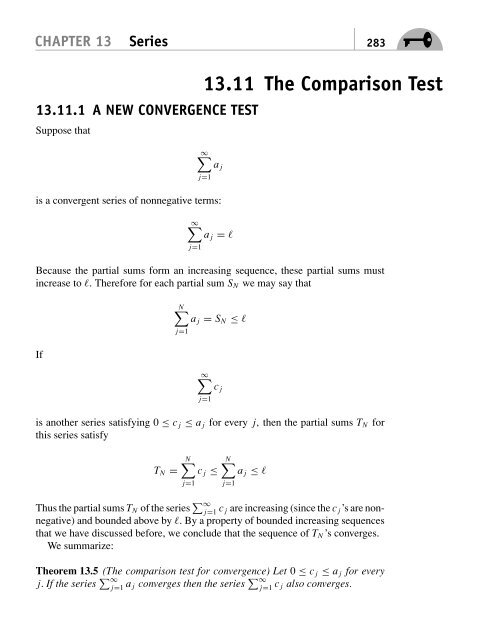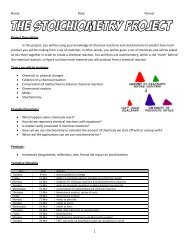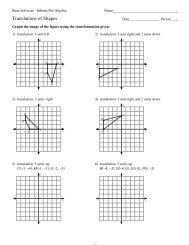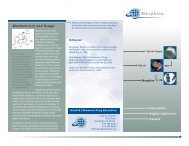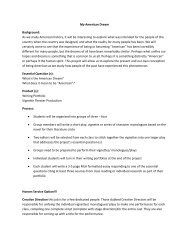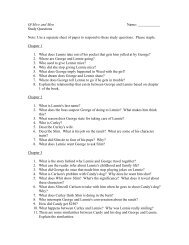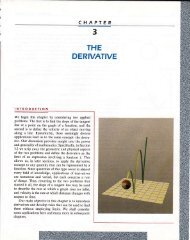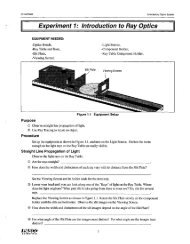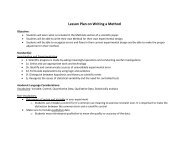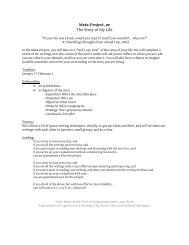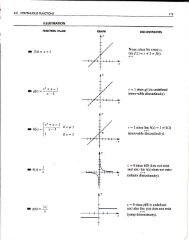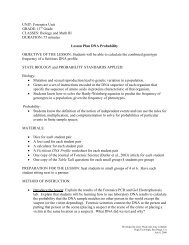- Page 2 and 3:
Discrete Mathematics Demystified
- Page 4 and 5:
Discrete Mathematics Demystified St
- Page 6 and 7:
To the memory of J. W. T. Youngs.
- Page 8 and 9:
CONTENTS Preface xiii CHAPTER 1 Log
- Page 10 and 11:
Contents ix CHAPTER 7 Matrices 135
- Page 12 and 13:
Contents xi Final Exam 301 Solution
- Page 14 and 15:
PREFACE In today’s world, analyti
- Page 16 and 17:
CHAPTER 1 Strictly speaking, our ap
- Page 18 and 19:
CHAPTER 1 Logic 3 The point of view
- Page 20 and 21:
CHAPTER 1 Logic 5 A B A∨ B T T T
- Page 22 and 23:
CHAPTER 1 Logic 7 In the next two s
- Page 24 and 25:
CHAPTER 1 Logic 9 the hypothesis (2
- Page 26 and 27:
CHAPTER 1 Logic 11 is the line in w
- Page 28 and 29:
CHAPTER 1 Logic 13 is the statement
- Page 30 and 31:
CHAPTER 1 Logic 15 and EXAMPLE 1.22
- Page 32 and 33:
CHAPTER 1 Logic 17 EXAMPLE 1.25 Loo
- Page 34 and 35:
CHAPTER 1 Logic 19 We conclude by n
- Page 36 and 37:
CHAPTER 1 Logic 21 6. For each of t
- Page 38 and 39:
CHAPTER 2 Methods of Mathematical P
- Page 40 and 41:
CHAPTER 2 Methods of Mathematical P
- Page 42 and 43:
CHAPTER 2 Methods of Mathematical P
- Page 44 and 45:
CHAPTER 2 Methods of Mathematical P
- Page 46 and 47:
CHAPTER 2 Methods of Mathematical P
- Page 48 and 49:
CHAPTER 2 Methods of Mathematical P
- Page 50 and 51:
CHAPTER 2 Methods of Mathematical P
- Page 52 and 53:
CHAPTER 2 Methods of Mathematical P
- Page 54 and 55:
CHAPTER 2 Methods of Mathematical P
- Page 56 and 57:
CHAPTER 3 Set Theory 3.1 Rudiments
- Page 58 and 59:
CHAPTER 3 Set Theory 43 Definition
- Page 60 and 61:
CHAPTER 3 Set Theory 45 EXAMPLE 3.8
- Page 62 and 63:
CHAPTER 3 Set Theory 47 A Figure 3.
- Page 64 and 65:
CHAPTER 3 Set Theory 49 Exercises 1
- Page 66 and 67:
CHAPTER 4 Functions and Relations 4
- Page 68 and 69:
CHAPTER 4 Functions and Relations 5
- Page 70 and 71:
CHAPTER 4 Functions and Relations 5
- Page 72 and 73:
CHAPTER 4 Functions and Relations 5
- Page 74 and 75:
CHAPTER 4 Functions and Relations 5
- Page 76 and 77:
CHAPTER 4 Functions and Relations 6
- Page 78 and 79:
CHAPTER 4 Functions and Relations 6
- Page 80 and 81:
CHAPTER 4 Functions and Relations 6
- Page 82 and 83:
CHAPTER 5 Number Systems 5.1 Prelim
- Page 84 and 85:
CHAPTER 5 Number Systems 69 P3 asse
- Page 86 and 87:
CHAPTER 5 Number Systems 71 Proposi
- Page 88 and 89:
CHAPTER 5 Number Systems 73 on fait
- Page 90 and 91:
CHAPTER 5 Number Systems 75 Adding
- Page 92 and 93:
CHAPTER 5 Number Systems 77 answer;
- Page 94 and 95:
CHAPTER 5 Number Systems 79 In an e
- Page 96 and 97:
CHAPTER 5 Number Systems 81 the quo
- Page 98 and 99:
CHAPTER 5 Number Systems 83 Theorem
- Page 100 and 101:
CHAPTER 5 Number Systems 85 Likewis
- Page 102 and 103:
CHAPTER 5 Number Systems 87 EXAMPLE
- Page 104 and 105:
CHAPTER 5 Number Systems 89 Similar
- Page 106 and 107:
CHAPTER 5 Number Systems 91 5.5.1 C
- Page 108 and 109:
CHAPTER 5 Number Systems 93 Notice
- Page 110 and 111:
CHAPTER 5 Number Systems 95 maximal
- Page 112 and 113:
CHAPTER 5 Number Systems 97 Remark
- Page 114 and 115:
CHAPTER 5 Number Systems 99 Theorem
- Page 116 and 117:
CHAPTER 5 Number Systems 101 the ab
- Page 118 and 119:
CHAPTER 5 Number Systems 103 4. Exp
- Page 120 and 121:
CHAPTER 6 Counting Arguments Althou
- Page 122 and 123:
CHAPTER 6 Counting Arguments 107 Fi
- Page 124 and 125:
CHAPTER 6 Counting Arguments 109 A
- Page 126 and 127:
CHAPTER 6 Counting Arguments 111 A
- Page 128 and 129:
CHAPTER 6 Counting Arguments 113 No
- Page 130 and 131:
CHAPTER 6 Counting Arguments 115 We
- Page 132 and 133:
CHAPTER 6 Counting Arguments 117 (o
- Page 134 and 135:
CHAPTER 6 Counting Arguments 119 he
- Page 136 and 137:
CHAPTER 6 Counting Arguments 121 an
- Page 138 and 139:
CHAPTER 6 Counting Arguments 123 It
- Page 140 and 141:
CHAPTER 6 Counting Arguments 125 ca
- Page 142 and 143:
CHAPTER 6 Counting Arguments 127 EX
- Page 144 and 145:
CHAPTER 6 Counting Arguments 129 k
- Page 146 and 147:
CHAPTER 6 Counting Arguments 131 Fi
- Page 148 and 149:
CHAPTER 6 Counting Arguments 133 2.
- Page 150 and 151:
CHAPTER 7 Matrices 7.1 What Is a Ma
- Page 152 and 153:
CHAPTER 7 Matrices 137 EXAMPLE 7.2
- Page 154 and 155:
CHAPTER 7 Matrices 139 and Calculat
- Page 156 and 157:
CHAPTER 7 Matrices 141 are all poin
- Page 158 and 159:
CHAPTER 7 Matrices 143 We encourage
- Page 160 and 161:
CHAPTER 7 Matrices 145 Translating
- Page 162 and 163:
CHAPTER 7 Matrices 147 If we guess
- Page 164 and 165:
CHAPTER 7 Matrices 149 Solution: We
- Page 166 and 167:
CHAPTER 7 Matrices 151 Finally we m
- Page 168 and 169:
CHAPTER 7 Matrices 153 7.5 Markov C
- Page 170 and 171:
CHAPTER 7 Matrices 155 Thus we disc
- Page 172 and 173:
CHAPTER 7 Matrices 157 Figure 7.2 A
- Page 174 and 175:
CHAPTER 7 Matrices 159 Figure 7.4 T
- Page 176 and 177:
CHAPTER 7 Matrices 161 f (0, 1, 1)
- Page 178 and 179:
CHAPTER 8 Graph Theory 8.1 Introduc
- Page 180 and 181:
CHAPTER 8 Graph Theory 165 in the e
- Page 182 and 183:
CHAPTER 8 Graph Theory 167 Figure 8
- Page 184 and 185:
CHAPTER 8 Graph Theory 169 8.3 Appl
- Page 186 and 187:
CHAPTER 8 Graph Theory 171 Figure 8
- Page 188 and 189:
CHAPTER 8 Graph Theory 173 Not a co
- Page 190 and 191:
CHAPTER 8 Graph Theory 175 Figure 8
- Page 192 and 193:
CHAPTER 8 Graph Theory 177 number o
- Page 194 and 195:
CHAPTER 8 Graph Theory 179 $65 D A
- Page 196 and 197:
CHAPTER 8 Graph Theory 181 Exercise
- Page 198 and 199:
CHAPTER 9 Number Theory 9.1 Divisib
- Page 200 and 201:
CHAPTER 9 Number Theory 185 k—the
- Page 202 and 203:
CHAPTER 9 Number Theory 187 then Al
- Page 204 and 205:
CHAPTER 9 Number Theory 189 Axiom 3
- Page 206 and 207:
CHAPTER 9 Number Theory 191 EXAMPLE
- Page 208 and 209:
CHAPTER 9 Number Theory 193 collect
- Page 210 and 211:
CHAPTER 9 Number Theory 195 are the
- Page 212 and 213:
CHAPTER 9 Number Theory 197 We may
- Page 214 and 215:
CHAPTER 10 Cryptography 10.1 Backgr
- Page 216 and 217:
CHAPTER 10 Cryptography 201 1 1 0 1
- Page 218 and 219:
CHAPTER 10 Cryptography 203 When wa
- Page 220 and 221:
CHAPTER 10 Cryptography 205 Thus if
- Page 222 and 223:
CHAPTER 10 Cryptography 207 The fir
- Page 224 and 225:
CHAPTER 10 Cryptography 209 choice
- Page 226 and 227:
CHAPTER 10 Cryptography 211 Next le
- Page 228 and 229:
CHAPTER 10 Cryptography 213 we see
- Page 230 and 231:
CHAPTER 10 Cryptography 215 Thus we
- Page 232 and 233:
CHAPTER 10 Cryptography 217 Then we
- Page 234 and 235:
CHAPTER 10 Cryptography 219 Unfortu
- Page 236 and 237:
CHAPTER 10 Cryptography 221 As you
- Page 238 and 239:
CHAPTER 10 Cryptography 223 A typic
- Page 240 and 241:
CHAPTER 10 Cryptography 225 Proof:
- Page 242 and 243:
CHAPTER 10 Cryptography 227 Name Va
- Page 244 and 245:
CHAPTER 10 Cryptography 229 For sup
- Page 246 and 247:
CHAPTER 10 Cryptography 231 7 1 6 F
- Page 248 and 249: CHAPTER 10 Cryptography 233 governm
- Page 250 and 251: CHAPTER 11 Boolean Algebra 11.1 Des
- Page 252 and 253: CHAPTER 11 Boolean Algebra 237 3. a
- Page 254 and 255: CHAPTER 11 Boolean Algebra 239 3. [
- Page 256 and 257: CHAPTER 11 Boolean Algebra 241 In s
- Page 258 and 259: CHAPTER 12 Sequences 12.1 Introduct
- Page 260 and 261: CHAPTER 12 Sequences 245 Remark 12.
- Page 262 and 263: CHAPTER 12 Sequences 247 Figure 12.
- Page 264 and 265: CHAPTER 12 Sequences 249 then we no
- Page 266 and 267: CHAPTER 12 Sequences 251 3. lim j
- Page 268 and 269: CHAPTER 12 Sequences 253 We conclud
- Page 270 and 271: CHAPTER 12 Sequences 255 3. If t =
- Page 272 and 273: CHAPTER 13 Series 13.1 Fundamental
- Page 274 and 275: CHAPTER 13 Series 259 and 7 j=3 c j
- Page 276 and 277: CHAPTER 13 Series 261 Insight: Do n
- Page 278 and 279: CHAPTER 13 Series 263 series is equ
- Page 280 and 281: CHAPTER 13 Series 265 Insight: The
- Page 282 and 283: CHAPTER 13 Series 267 where the ove
- Page 284 and 285: CHAPTER 13 Series 269 But we learne
- Page 286 and 287: CHAPTER 13 Series 271 converges. Bu
- Page 288 and 289: CHAPTER 13 Series 273 converges. Si
- Page 290 and 291: CHAPTER 13 Series 275 EXAMPLE 13.22
- Page 292 and 293: CHAPTER 13 Series 277 converge as N
- Page 294 and 295: CHAPTER 13 Series 279 13.9.1 AN APP
- Page 296 and 297: CHAPTER 13 Series 281 a 1 a 2 a 4 F
- Page 300 and 301: CHAPTER 13 Series 285 Solution: Not
- Page 302 and 303: CHAPTER 13 Series 287 This simplifi
- Page 304 and 305: CHAPTER 13 Series 289 EXAMPLE 13.36
- Page 306 and 307: CHAPTER 13 Series 291 converges bec
- Page 308 and 309: CHAPTER 13 Series 293 The limit of
- Page 310 and 311: CHAPTER 13 Series 295 be a series.
- Page 312 and 313: CHAPTER 13 Series 297 EXAMPLE 13.48
- Page 314 and 315: CHAPTER 13 Series 299 In each of Ex
- Page 316 and 317: Final Exam 1. What is the contrapos
- Page 318 and 319: Final Exam 303 (d) B∧ ∼B (e) A
- Page 320 and 321: Final Exam 305 18. Let S be the col
- Page 322 and 323: Final Exam 307 (c) An irrational nu
- Page 324 and 325: Final Exam 309 (d) A useful device
- Page 326 and 327: Final Exam 311 (c) 0.00004 (d) 0.02
- Page 328 and 329: Final Exam 313 (c) x = 5, y = 3, z
- Page 330 and 331: Final Exam 315 (c) 3 (d) 5 (e) 1 63
- Page 332 and 333: Final Exam 317 (c) Z/4Z (d) R (e) Q
- Page 334 and 335: Final Exam 319 82. The boolean expr
- Page 336 and 337: Final Exam 321 (d) Displays. (e) Ra
- Page 338 and 339: Final Exam 323 Solutions 1. (b) 21.
- Page 340 and 341: Solutions to Exercises This book ha
- Page 342 and 343: Solutions to Exercises 327 Chapter
- Page 344 and 345: Solutions to Exercises 329 10. If o
- Page 346 and 347: Solutions to Exercises 331 and ther
- Page 348 and 349:
Solutions to Exercises 333 5. -6 -
- Page 350 and 351:
Solutions to Exercises 335 among th
- Page 352 and 353:
Solutions to Exercises 337 5. −1
- Page 354 and 355:
Solutions to Exercises 339 Figure 8
- Page 356 and 357:
Solutions to Exercises 341 Givena2
- Page 358 and 359:
Solutions to Exercises 343 3. We no
- Page 360 and 361:
Solutions to Exercises 345 Chapter
- Page 362 and 363:
Bibliography [ADA] J. F. Adams, On
- Page 364 and 365:
A Abel, Niels Henrik, 188 Abelian g
- Page 366 and 367:
INDEX 351 relations, 65 sequences,
- Page 368 and 369:
INDEX 353 Partitioning, 54 Pascal,


